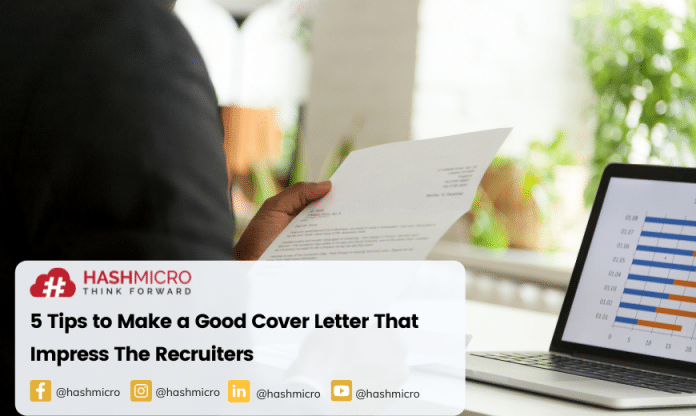When you want to apply for a job, you will prepare several documents to submit to the company. These documents are usually in a job application letter, CV, or another supporting certificate. A cover letter is designed to strengthen your resume.
Your resume highlights your achievements, while this letter highlights your personality and explains why you’d be a good match for the company.

Table of Contents
- What is a Cover Letter?
- Differences between Cover Letter, CV, and Resume
- Tips for Writing a Good Cover Letter
- Examples of Cover Letter
- Conclusion
What is a Cover Letter?
A cover letter is a letter that you address to a person or company that opens a job application. It explains how your skills match the job, what you can provide to the company, and why you want the job.
It helps recruiters and hiring managers to get a candidate that meets the standards desired by the company. In this case, the company can use the competency management system to map the skills of employees after the recruitment process is completed.
This letter includes your winning resume when applying for a job, using an AI resume builder can help tailor your resume, while your cover letter goes into further depth on how your skill set fits the job, what you can contribute to the team, and why you’re interested in the position.
Cover letters should express your interest in the post and elaborate on the abilities and experiences that make you the ideal candidate for the job. It can also help recruiters and hiring managers assess your fit for a post, especially if you use a site to find places hiring near you. Having a cover letter will transmit a more personalized feeling for those recruiters and give you a better chance at an interview.
Differences between Cover Letter, CV, and Resume
Many people are still confused by the distinction between cover letters, resumes, and curriculum vitae when applying for jobs. While all three positions are critical, these papers may boost candidates’ progress to the next step. The differences between the three documents are shown below:
- A cover letter contains an introduction about yourself about the position for which you are seeking. This letter is typically one page in length, including a header, introduction, body, and conclusion.
- A Resume is a list of your jobs. It describes your employment history, education, certifications, talents, and other quantitative information. Your contact information is usually included first, followed by an experience section with work titles, descriptions, dates, and additional relevant information. While including all this information on a small document sounds difficult, creating a perfect resume is possible with a great template or resume builder app that offers customizable features, professional designs, and industry-specific examples to guide you in showcasing your skills and experience effectively. If you’re interested in enhancing your resume further, consider exploring how to build a resume website a complete guide, which can provide valuable insights on creating a standout online resume presence.
- A curriculum vitae (CV) may contain a cover letter and other information necessary when applying for international jobs, fellowships, grants, research, scientific, and academic posts. When seeking work, the CV is used to assess candidates, often followed by an interview.
Tips for Writing a Good Cover Letter
The purpose of this letter is to indicate that you are literate, experienced, and excited about employment. A well-written cover letter allows you to demonstrate these vital traits to the reader, so take the time to write a good one.
1. Focus on your future goals
In contrast to your resume or curriculum vitae, which includes academic or professional experience, your cover letter should place a greater emphasis on your objectives. Particularly in your cover letter, provide information about the employment opportunity for which you are applying.
2. Simplify your letter
Communicate straightforwardly and concisely. Using complicated phrases and sentences will almost surely fail to communicate your aims with the company. The individual reading the letter will likely ignore the reminder of your application.
3. Pay more attention to vocabulary and avoid typographical error
Nothing is more terrible than a cover letter with an obvious spelling mistake. A typographical error in your letter demonstrates a lack of attention to detail and a lack of concern for proofreading. As a result, it’s critical to double-check your work and have a buddy do the same before submitting it. A second opinion might go a long way toward landing an interview.
4. Describe your skill and experience
While soft skills and academic abilities are vital for landing an interview, you must show your experience following the job description. For further insights on effectively integrating your work experience in your resume, consider exploring additional resources that provide comprehensive guidance. In your cover letter, make sure to include examples of relevant experience to demonstrate the value you would bring to the role and why you would be the ideal candidate for the job. If you are a graphic designer, for instance, you should make a cover letter for graphic designers and emphasize your relevant qualifications and expertise.
5. Do some company research
A well-crafted, appealing cover letter demonstrates that you have researched the company and are familiar with its needs and job requirements. It’s a chance to show that you’re excited about the job, eager to join the team, and can illustrate the value you would bring to the firm.
Examples of Cover Letter
Example 1:
Example 2:
Conclusion
A cover letter is critical, even more so if you are seeking work. This letter may help job applicants seem more professional and provide value in the eyes of human resource directors. For recruiters, this letter serves to screen candidates and select the individual who most closely matches the job criteria to proceed to the interview stage.
However, if you are a recruiter and your company is experiencing difficulty maintaining application and employee files, you may use the help of Eva Recruitment Management by HashMicro. Simplify the recruitment process in your company automatically. In addition, this system integrates with various recruitment portals to facilitate data collection. You can start HashMicro’s EVA Recruitment Management Software demo for free now.















